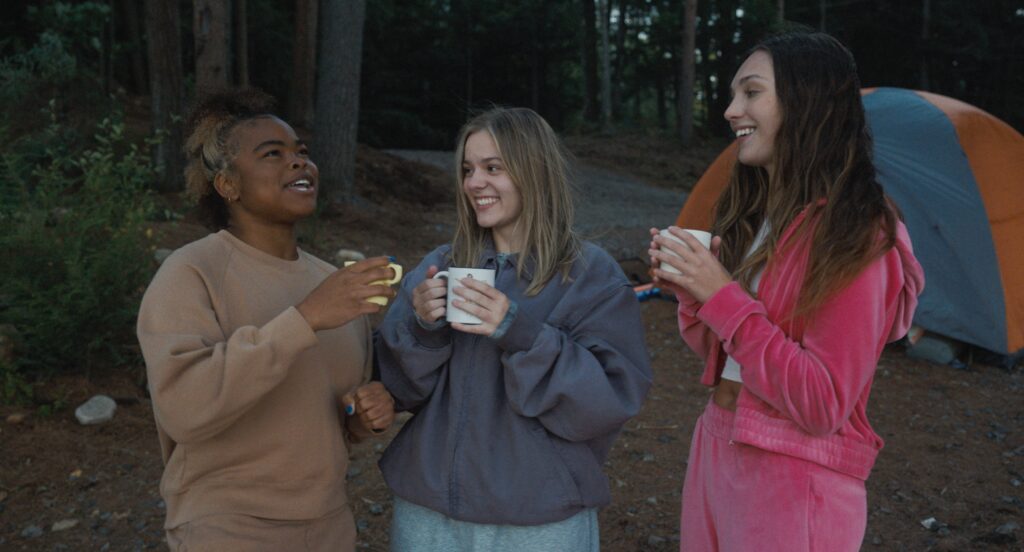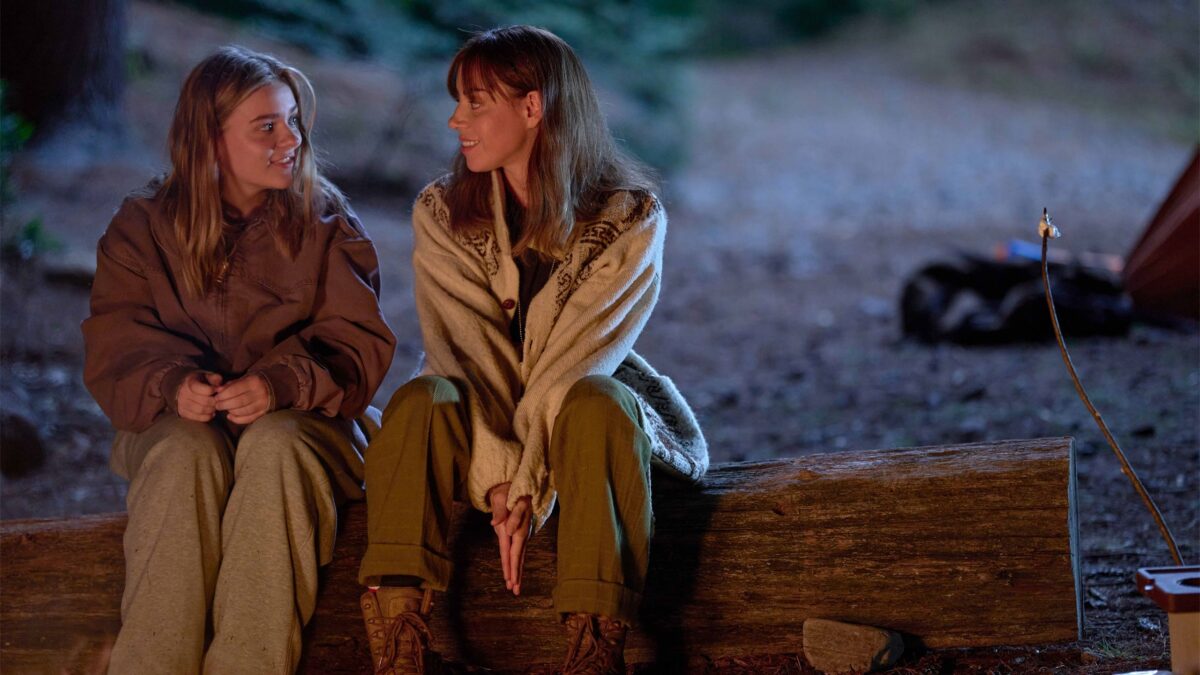Playing ass and loose
My Old Ass has a premise that is evocative and mystical until you think about it for ten seconds. Eighteen-year-old Elliott (Maisy Stella) celebrates one of her last days in her hometown by taking some shrooms with her friends. While tripping, she has a conversation with her 39-year-old self (Aubrey Plaza) from the future, who is ready to pass along some wisdom about appreciating her youth and living in the moment. Neat.
But if she is having a conversation with her older self, who has all the knowledge of 18-year-old Elliott’s next 21 years, I have some questions. Is young Elliott’s timeline mutable or immutable? In other words, did the 39-year-old we meet have this same conversation, and that informed all of her subsequent actions, or are we altering timelines? Can 39-year-old Elliott impart information that 18-year-old Elliott can use to improve her future?
The film fudges the matter a little without a firm answer, which also serves a thematic purpose (i.e. part of being young is making mistakes and learning from them). But it suggests throughout that 18-year-old Elliott has the means to change her future, that the life that 39-year-old Elliott lived through does not have to unfold exactly as it did the first time through. And so young Elliott asks basically the first question that almost any sensible person would ask: What stocks can I invest in, and what historical events can I prepare for? In a bit of lazy writing, 39-year-old Elliott completely dodges on this. She literally replies a slight variation of “I probably shouldn’t say.” More baffling still, 18-year-old Elliott moves on. But my Back to the Future-addled brain could not let it go so easily.

There is an obvious workaround, especially given the drug-ingestion setup. The film could keep the time travel questions in check if it made clear, or at least left open the possibility, that old Elliott is a mere hallucination, a manifestation of 18-year-old Elliot’s own slow-boiling wisdom and regrets already deep within the recesses of her brain. And yet My Old Ass explicitly does not do this. I actually admire that Megan Park, the director and writer, makes its premise quite literal; old Elliott exists in very physical, non-hallucinated ways, though the film plays around with the idea. (Late in the film is a pretty good gag in which young Elliott discovers whether old Elliott is visible to other people.) And we can say with confidence that old Elliott knows the future: she makes a few key revelations and predictions that young Elliott could not know that come incontrovertibly true. In other words, this is indeed a time travel movie.
Park realizes about halfway through the film that old Elliott can’t really reveal too much to young Elliott if she wants to keep the story in the “introspective indie dramedy” mode rather than “speculative fantasy.” Omniscience is boring, anyways. Plaza disappears for major portions of the film, which is a bummer given that Plaza is by far the funniest member of the cast here (and also the major thrust of the film’s marketing and pitch).
While the general theme of the film is about appreciating your youth and family and the carefree joy of young adulthood, the central conflict comes from a very specific warning old Elliott makes about a charming boy, Chad (Percy Hynes White). Avoid him at all costs, old Elliott warns young Elliott. But he seems perfect. How could such a wholesome and handsome boy spell trouble?
The film suffers from some pretty major problems. The first is that Aubrey Plaza does not resemble Maisy Stella barely at all. Their hair, faces, builds, demeanors, and screen presences read as totally different people. This could ostensibly be a surface-level issue — indeed, I tend not to mind much if family members don’t look like each other so long as the chemistry and personalities are there. But when they are literally the same person and they don’t seem like it at all, it is very distracting. I know people change in 20 years, but every late-30s person I know (being one myself) looks a lot like their teenage self. Fatter and balder, maybe (not me), but still obviously the same person. Not here. Plaza ultimately plays the role more like a guardian angel than a future clone, and it throws off the entire pitch of the film.

Another issue is Elliott herself, who is both empty as a character and unpleasant. I know I risk being a hypocrite here because I’ve been fond of plenty of films with bland cishet male leads and not held their protagonists against them too much. Maybe my annoyance at Stella’s take on young Elliott in a film that practically begs to have an ordinary, bored teen lead is a failure of my own empathy. But I simply did not enjoy the time spent with her and did not much care about her character growth. Because the film pushes Plaza’s older Elliott aside for much of the second half, young Elliott is essentially all the movie offers, making this a movie-ruining problem.
Another problem I’d likely be more patient with if the gender roles were flipped due to my own identity: I found Chad to be a dull potential love interest. First of all, his name is Chad. Why would a writer pick this name for a character in 2024? I guess his name tells you what you need to know: Chad is a “Chad” in the meme usage of the name. He is a manic pixie dream boy, no internal life or development, a paragon of confident virtue who only shines brighter the harder young-Elliott tries to figure out what fatal flaw has inspired such hatred in old-Elliott. By contrast, I wondered over and over: What does Chad see in Elliott, other than that she’s unattached, blonde, and kinda cute? The story provides no answers, although White and Stella have decent chemistry.
(Elliott has a strange wrinkle about her I don’t think I’ve ever seen before in a teen film protagonist. She starts the film comfortably out as a lesbian, making her growing attraction to Chad the reverse of the common same-gender queer awakening of films like these. Over the runtime, she realizes she is not lesbian but bisexual. Or maybe just Chad-sexual.)

The film develops its narrative in a baffling anti-boil rhythm, with one conflict after another defusing. We keep waiting for the other hammers to drop, but they never do. A fake-out romance in the first act fizzles with little angst. Elliott never beefs with her friends or her parents in any major way. The tension really all comes from Elliott’s attempt to figure out Chad’s dark secret and squeeze some more info out of her old self.
The ending is pretty predictable by the time My Old Ass has staked out its sentimental streak. Wouldn’t you know it? The kids are alright. I kept hoping for a curveball, some dark twist to jerk the film out of its drifting gentleness and warmth. Something to give it shape. But nope. The farewell-to-youth vibes made me feel nostalgic and sad once or twice, but are too fuzzy and generic to pack much punch. A couple throwaway jokes by Plaza about a dystopian future don’t add any spice. All sadness is deferred. The film has a couple of genuinely delightful scenes (a wonderful, Justin Bieber-themed sequence is one of the film’s only swings), but far more forgettable ones. My Old Ass is watchable and warm but completely pointless.
Is It Good?
Not Very Good (3/8)
Dan is the founder and head critic of The Goods. Follow Dan on Letterboxd. Join the Discord for updates and discussion.


2 replies on “My Old Ass (2024)”
I’m a little perplexed, given all that, that it’s just not a late 90s (early 00s! hell, 10s! Plaza is not especially old and can still play, like, 28) period piece. Then you can just do “the future.”
They look so dissimilar that I assumed until I was told it was literally just a buddy comedy about a 40 year old and 20 year old.
“Fatter and balder, maybe (not me)”
More muscular and, uh, more streamlined, for me.
I suppose I actually am “fatter” than I was when I was 19-20 because I had a really severe case of GERD and dropped down to skin and bones for a couple years.